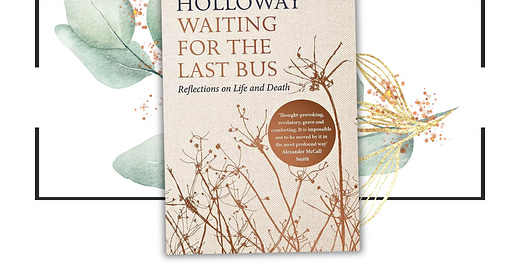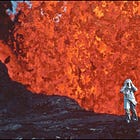The Last Chapter of Life
How the tools of storytelling help us navigate living and dying well.
A magician, a priest, and a radio host walk into a podcast studio.
This wasn’t the setup to a joke, but a conversation between the irreverent reverend Richard Coles and the magician Derren Brown. Over the course of an hour, the two men discussed faith, scepticism, and the good life. When the dialogue turned existential, Brown told Coles:
“If you watch a movie or read a book, that last chapter makes sense of everything that happened before. But when we get to the end of a life, things just end, and it’s absurd and meaningless ... This is a good example of where our myths have abandoned us.”
Putting aside my quibble with the phrasing — it’s not so much that our myths have abandoned us, but that we abandoned them — this is an important observation.
The postmodernists told us that stories are not objective facts; the new atheists preached that facts were all that mattered; eventually our culture decided that fiction could — indeed should — be done away with. We stripped myth from our lives and so lost our best method of addressing the mysteries of being human, including our deaths. As Brown put it:
“There is no narrative around death ... Unless you find [a narrative] for yourself, what happens at the end? You probably feel like a cameo to your own death because the main roles have gone to the doctors or your loved ones ... And that’s one time when you should really be able to take ownership of a story and find closure for it in the way that you would in a film or a book.”
So, here’s the question: how do we come to a satisfying close in the last chapter of our lives?
The Language of Stories
Raymond Radiguet, who had time to publish only one novel before his death at age 20, wrote:
“The painful thing is not to leave life, but to leave whatever gives it meaning.”
It’s often the loss of loved ones that troubles us about dying — not so much the going as the leaving. For those with no belief in an afterlife, and even for those who believe in Heaven, there’s no worry for the dead because there’s no longer anything to trouble them; we, the living, grieve for ourselves, for the absence of the one who’s left us. Our own death is this loss of a loved one but extended to every person we know in a single moment. At the point of our dying, we lose absolutely everyone.
There’s not much that can be done about that brute fact, yet our souls rage against it in quiet moments when the rush of daily living no longer distracts us from mortality. In the face of unpleasant realities I cannot change, I turn to the Stoics, who taught us to change our response to the world rather than huffing and puffing at a world that won’t fall down. The philosophers teach us that our eventual meeting with death shouldn’t be a struggle with an enemy. Instead, we should greet death with a calm embrace, accepting its inevitability, allowing it to lend meaning to all that came before.
How might we come to such impassive acceptance? By turning not to mere facts but to the language of stories. Thankfully, even in the midst of our culture’s disbelief, some have continued to speak the ancient languages of faith, myth, and meaning. Richard Holloway is one such person. The former Bishop of Edinburgh’s writing on morality and humanism is indispensable, but what he tells us about living and dying well means the most to me.
In Waiting for the Last Bus, Holloway lays the groundwork for how we might fully face down death. He reminds us that “there is no escape from anguish. It comes with the human condition”. He then suggests, “The fleeting pain of admitting our situation is preferable to the constant pain of denying it.” Sadness at what we’ll miss should be a minor melody somewhere in the music of our final days, but the lead chorus should sing of gratitude:
“We won a rare lottery when we were born. There must have been something in our DNA that beat the odds against fusing the sperm with the egg that made our particular existence possible. Millions did not make it off the wasteful assembly line in the great reproduction factory of life. We got through. We made it. For that at least we should be grateful; and even more grateful for the world that received and nurtured us.”
We will always be sad to let go of those we love, but we can also be grateful that we had the opportunity to love them and they us. Gratitude is the antidote to greed for more life, greed that cannot be sated and hollows us out before the final disappointment. Holloway describes this as “the inability to enjoy what we have now because we are already lusting after the next edition”. He adds, “So be brave in the face of death, and be sad at leaving. But don’t let those be your final emotions. Let it be gratitude for the life you had.”
Gratitude does not need an object to point at, though God, or the Divine, or the universe itself make suitable icons at which to aim your thanks. But gratitude can be something felt within, without the need to extend it outwards. And if in your final moments you need help locating a sense of this gratitude, you could do worse than turning to poetry. Holloway recommends Clive James’ response (in the poem “Event Horizon”) to the question of what life matters if it’s all going to end anyway:
This much: you get to see the cosmic blaze
And feel its grandeur, even against your will,
As it reminds you, just by being there,
That it is here we live or else nowhere.
Save One Life, Save the World
Is it enough to be grateful for “the cosmic blaze”, for the beauty and wonder experienced in one’s life? Probably not. Reminiscing about sights seen and food tasted in a foreign country might be all you need to see the holiday as worth your time. But do you want to end eighty or so years as a tourist in life? The grandeur is part of what makes it wonderful, but it’s not, on its own, enough to make life feel well-lived. For that, we need to go deeper. We need other people, and we need to believe that just as they’ve shaped our souls, we’ve shaped theirs in turn. The best stories, after all, have a hero.
In his memoir, Christopher Hitchens writes about a dinner he once had with William Styron, who’d written Darkness Visible, a short book about his depression. They had an interesting encounter with their “pimply and stringy-haired” waiter:
“Bringing back Bill’s credit card he remarked that it bore a name that was almost the same as that of a famous writer. Bill said nothing. Tonelessly, the youth went on: ‘He’s called William Stryon.” I left this up to Bill, who again held off until the kid matter-of-factly said, “Anyway, that guy’s book saved my life.’ At this point Styron invited him to sit down, and he was eventually persuaded that he was at the same table as the author of Darkness Visible. It was like a transformation scene: he told us brokenly of how he’d sought and found the needful help.”
Styron had won the Pulitzer Prize, and one of his novels was adapted into an Oscar-nominated movie — but it’s this scene I’d be most proud of on my deathbed. To so affect even one person is to be that much bigger than myself, to transcend the individuality inside which I find lesser meaning.1
Horace Mann once wrote, “Until you have done something for humanity, you should be ashamed to die.” A life in service to others is a life of purpose; to die in place of a loved one, or for a greater good, or in defence of transcendent values, that is to die with meaning. To exit life struggling against death’s bouncers, mourning that the party will go on without you, is to become a victim of death.
Of course, grand causes worth dying for are fine if you can find them, but what about those of us who might only be remembered by a handful of family members before they too pass away? What purpose can be found in the smaller spaces of everyday life to permit us a meaningful death? Can heroism be found in the quotidian lives of mere mortals?
Life has convinced me time and again, through many wonderful people of outsized kindness and generosity, that we can all live lives of what I call “ordinary heroism”. Sometimes, this means attempting to change how an entire generation thinks; often, it manifests in how a person raises their own child. There are times when it means bringing down an institutional evil; occasionally and wonderfully, it means sheltering one soul from suffering or bringing joy to another. As I’ve written elsewhere:
The real heroes are the ordinary people who show up to the task of living every day, who give without holding back, who love heroically — as though love were a superpower that might redeem the world. Their actions might seem small, but the hope they hold and inspire is epic.
Much of life is made up of the small wonders and grand beauty — the cosmic blaze — which we can appreciate at the end of our lives. But all of that will be the backdrop to the moments of moral greatness we’re all called to in our lives. That opportunity to be more than ourselves and to matter more than our own self-interest and appetites is something to be truly grateful for when we reach the last page of our story.
Further Reading:
I know that will horrify my libertarian friends, but I also live for those moments of offending sensibilities with which I don’t agree. Argument should be sought for its own sake, Hitchens used to say, because “the grave will supply plenty of time for silence”.







